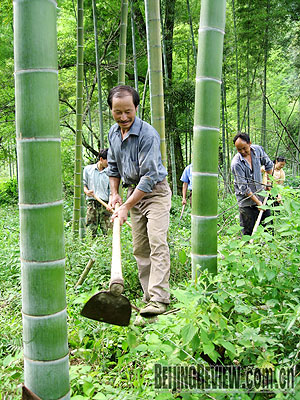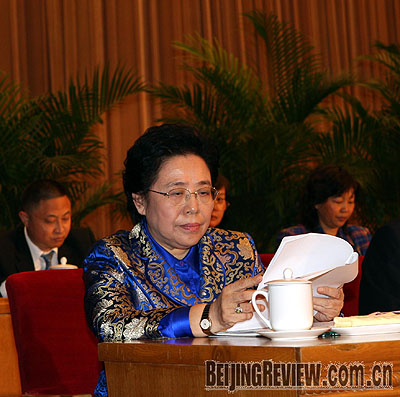|

GREEN AND PROSPEROUS: Farmers in Tonggu County, Jiangxi Province, take care of bamboo. In China, about 35 million farmers are engaged in bamboo planting and processing
On October 8, 2008, the China Eco-Culture Association (CECA), the first nationwide non-profit organization dedicated to promoting eco-culture in China, was launched in Beijing. Jiang Zehui, President of CECA, explained to Beijing Review the mission of the association and the meaning of eco-culture. Jiang is also vice chairwoman of the Committee of Population, Resources and Environment of the National Committee of the Chinese People's Political Consultative Conference (CPPCC) and co-chair of the board of trustees, International Network for Bamboo and Rattan (INBAR).
 ECO-PIONEER: Jiang Zehui, President of the China Eco-Culture Association, at the founding meeting of the association on October 8
ECO-PIONEER: Jiang Zehui, President of the China Eco-Culture Association, at the founding meeting of the association on October 8
Ecological protection and sustainable development are a global trend. In China, afforestation and ecological protection have received increasing attention from the people, and have been listed at the top of the government's agenda. In the meanwhile, academic research on eco-culture has been fruitful. These trends led to the establishment of CECA, said Jiang.
In July 2006, the State Forestry Administration submitted an official application to the Ministry of Civil Affairs to set up CECA. The application was approved by the State Council. After numerous meetings and more than nine months of preparation, CECA was officially born.
CECA is affiliated with the State Forestry Administration and is located in the International Center for Bamboo and Rattan of the ministry. It consists of a secretariat and three offices, a general office, a liaison department and a business department.
Although eco-culture is a relatively new concept in China, it has been deeply rooted in traditional Chinese culture, according to Jiang. Chinese philosophy emphasizes harmony between people and nature. For instance, Taoism advocates that man should follow the law of nature while Confucianism believes that heaven, earth and people are interdependent. Buddhism preaches love of all living creatures and forbids killing. In the past Chinese rulers have held that nature and people should be given time to rest and restore. Traditional literature is full of love of nature. The concept of eco-culture can also be found in folklore and social customs.
After its founding, CECA will be committed to its missions, including disseminating knowledge about eco-culture, promoting green production and consumption, coordinating relevant research, facilitating the application of research results, periodically selecting China eco-culture demonstration bases, hosting eco-culture summit meetings, boosting eco-culture related industries and producing related cultural products, promoting international cooperation and exchanges and delivering related training and publications.
CECA is a national multidiscipline non-profit organization. It has invited officials from the National People's Congress or CPPCC to serve as its honorary presidents and associate presidents, and has invited about 20 organizations to be its partners, including government agencies, large non-profit organizations and state-owned enterprises. Leaders of local forest bureaus have also been invited to be executive council members and many knowledgeable figures have been asked to sit on the panel of experts.
|
